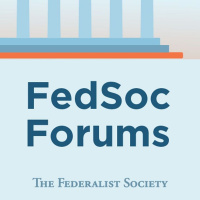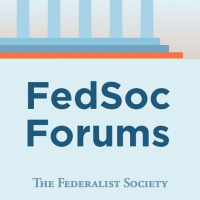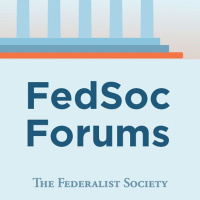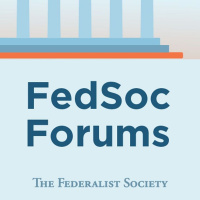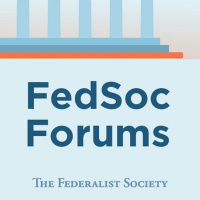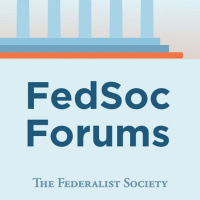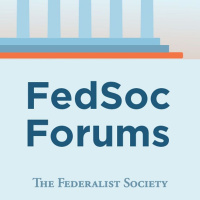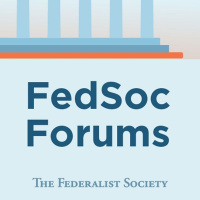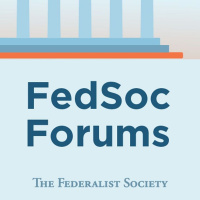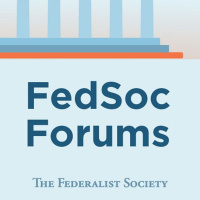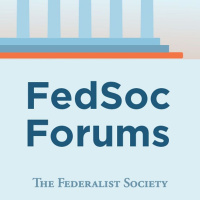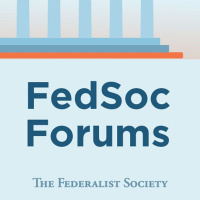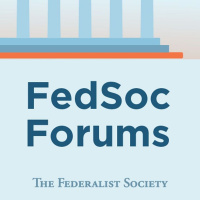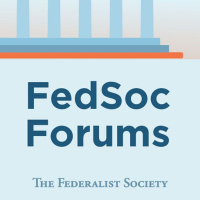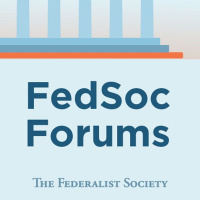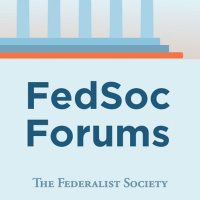Sinopsis
This series of podcasts features experts who analyze the latest developments in the legal and policy world. The podcasts are in the form of monologues, podcast debates or panel discussions and vary in length. The Federalist Society takes no position on particular legal or public policy issues; all expressions of opinion are those of the speakers. We hope these broadcasts, like all of our programming, will serve to stimulate discussion and further exchange regarding important current legal issues.
Episodios
-
Litigation Update: Henderson and Parents Defending Education
08/04/2025 Duración: 51minHow much control can public schools exercise over the speech of their students and staff on divisive issues such as anti-racism and using preferred pronouns? Two en banc cases out of the Sixth Circuit and Eighth Circuit are poised to answer that question soon. In Henderson v. Springfield R-12 School District, the Eighth Circuit will decide whether a school district’s “equity training” violated the First Amendment by requiring employees to give the school’s preferred answer to questions about ideologically charged issues such as anti-racism and white privilege. The panel held that the plaintiffs lack standing because the district never punished or threatened to punish anyone for remaining silent or expressing dissenting views. The Eighth Circuit granted rehearing en banc and heard argument on January 15, 2025. In Parents Defending Education v. Olentangy Local School District Board of Education, the Sixth Circuit will decide whether a school district’s anti-harassment policies viol
-
Courthouse Steps Oral Argument: Catholic Charities Bureau, Inc. v. Wisconsin Labor & Industry Review Commission
08/04/2025 Duración: 01h46sOn March 31, 2025, the Supreme Court will hear oral arguments in Catholic Charities Bureau v. Wisconsin Labor & Industry Review Commission.Wisconsin’s unemployment insurance program provides financial assistance to those who have lost their job through no fault of their own. Under state law, certain nonprofit organizations can opt out of the program, including those operated primarily for religious purposes. Catholic Charities of the Diocese of Superior—a religious ministry that serves people with disabilities, the elderly, and the impoverished—requested an exemption from the state’s program so that it could enroll in the Wisconsin Bishops’ Church Unemployment Pay Program (CUPP), which provides the same level of unemployment benefits.Last year, the Wisconsin Supreme Court ruled that Catholic Charities could not receive an exemption because its charitable work was not “typical” religious activity. The court said that Catholic Charities could only qualify for an exe
-
Courthouse Steps Oral Argument: Louisiana v. Callais
01/04/2025 Duración: 01h05sLouisiana's congressional districts, which it redrew following the 2020 census, currently sit in a state of legal uncertainty.The map initially only had one majority-black district. However, following a 2022 case called Robinson v. Ardoin (later Laundry), which held that it violated section 2 of the Voting Rights Act, Louisiana re-drew the map to include two majority-black congressional districts.In January 2024, a different set of plaintiffs sued alleging the new map violated the Fourteenth and Fifteenth Amendments. A 2-1 panel agreed the new map violated the Equal Protection clause of the Fourteenth Amendment and enjoined the new map. Given the timing, the case briefly went up to the Supreme Court which granted an emergency application for stay, citing Purcell v. Gonzalez. That allowed the 2022 map to be used for the 2024 elections.Now the case is before the Supreme Court again, this time with a range of issues for the court to address including: (1) Whether the majority of the three-judge district court in
-
Courthouse Steps Decision: Delligatti v. United States
01/04/2025 Duración: 45minDelligatti v. United States concerned whether a crime that requires proof of bodily injury or death, but can be committed by failing to take action, has as an element the use, attempted use, or threatened use of physical force.Known by some as the "non-violent murder case" Delligatti ties into a larger conversation on the way "violent"/"use-of-force" crimes are defined categorically rather than on a solely case-by-case basis.Oral argument was heard by the Supreme Court in early November 2024, and on March 21, 2025, a 7-2 Court affirmed the ruling of the Second Circuit below against Delligatti.Join us for a discussion of this decision and its possible ramifications.Featuring:Matthew P. Cavedon, Robert Pool Fellow in Law and Religion, Emory University School of Law
-
The Roots, Applications, and Trajectory of the Church Autonomy Doctrine
01/04/2025 Duración: 01h04minThe First Amendment’s Religion Clauses guarantee religious entities the freedom to make certain internal governance decisions without State interference. Supreme Court cases like Kedroff v. St. Nicholas Cathedral (1952), Serbian Eastern Orthodox Diocese v. Milivojevich (1976), Hosanna-Tabor Evangelical Lutheran Church & School v. EEOC (2012), and Our Lady of Guadalupe School v. Morrissey-Berru (2020) have affirmed that this constitutional protection bars civil courts from intruding into some religious matters involving faith, doctrine, and church governance. However, lower courts differ in some respects on how to understand and apply the “church autonomy doctrine.” The panel will explore the roots of the church autonomy doctrine, its recent applications, and its implications and trajectory.Featuring:Prof. Thomas C. Berg, James L. Oberstar Professor of Law and Public Policy, University of St. Thomas School of LawProf. Leslie C. Griffin, William S. Boyd Professor of Law, University of Neva
-
Can the Federal Government Ban At-Home Distilling?
26/03/2025 Duración: 58minAfter the U.S. Supreme Court in Morrison v. Olson (1988) and U.S. v. Lopez (1995) held two federal statutes were unconstitutional as those statutes were beyond the power of Congress to enact, some claimed it was the dawn of a new federalism revolution. However, such challenges to federal power did not seem to continue.Now, a new case McNutt v. DOJ, once again directly challenges whether a federal statute is beyond Congress’s power to enact. This time, the challenge is to the federal ban on at-home distilling. This case raises substantial issues concerning the scope of Congress’s power and how much decision-making authority the Constitution left for states to decide.This FedSoc Forum will provide an update on what has occurred so far and discuss the important issues raised by this case.Featuring:Thomas Berry, Director, Robert A. Levy Center for Constitutional Studies, Cato InstituteMichael Pepson, Regulatory Counsel, Americans for Prosperity FoundationEric J. Segall, Ashe Family Chair Professor of
-
Unleashing American Energy at CEQ
25/03/2025 Duración: 59minOn his first day back in office, President Trump issued Executive Order 14154 (Unleashing American Energy). Among numerous other objectives, this broad Executive Order directs the White House Council on Environmental Quality (CEQ) to “expedite and simplify the permitting process” by providing guidance on the implementation of the National Environmental Policy Act (NEPA) and rescinding CEQ’s NEPA regulations.Less than four weeks later, CEQ issued a Memorandum for Heads of Federal Departments and Agencies on how to conform their NEPA practices to the President’s Executive Order and other factors. Less than a week after that, CEQ published an interim final rule removing its NEPA regulations. Among the potential intended impacts of these actions is more expeditious federal government reviews of environmental permits. Even before these Executive Actions, courts had expressed concern over CEQ’s NEPA regulations. In November 2024, the D.C. Circuit held the CEQ regulations to be ultra vi
-
Disinformation in Broadcasting and the Public Interest Standard
25/03/2025 Duración: 01h26sThe Communications Act of 1934 requires that licensees operate consistent with the “public interest convenience and necessity.” Broadcast licenses, held by broadcast TV and radio stations as trustees of the public’s airwaves, must use the broadcast medium to serve the public interest and their local communities. In recent years, concerns have been raised about how broadcasters are fulfilling these obligations, particularly regarding the nature of their news programming. Complaints have been filed at the FCC against all of the major broadcast networks raising concerns about the quality and reliability of their coverage. Our panel will examine these issues, the role of government in policing broadcasters and the First Amendment protections afforded to broadcasters’ speech. Featuring: Bob Corn-Revere, Chief Counsel, FIREDavid Gibber, Executive Vice President/Chief Legal Officer, Sinclair Broadcast GroupDaniel Suhr, President, Center for American RightsModerator: Patricia J. Paoletta, Par
-
A Seat at the Sitting - March 2025
25/03/2025 Duración: 01h29minEach month, a panel of constitutional experts convenes to discuss the Court’s upcoming docket sitting by sitting. The cases covered in this preview are listed below.Louisiana v. Callais (March 24) - Election law, Civil Rights; Issue(s): (1) Whether the majority of the three-judge district court in this case erred in finding that race predominated in the Louisiana legislature’s enactment of S.B. 8; (2) whether the majority erred in finding that S.B. 8 fails strict scrutiny; (3) whether the majority erred in subjecting S.B. 8 to the preconditions specified in Thornburg v. Gingles; and (4) whether this action is non-justiciable.Riley v. Bondi (March 24) - Immigration; Issue(s): (1) Whether 8 U.S.C. § 1252(b)(1)'s 30-day deadline is jurisdictional, or merely a mandatory claims-processing rule that can be waived or forfeited; and (2) whether a person can obtain review of the Board of Immigration Appeals' decision in a withholding-only proceeding by filing a petition within 30 days of that decisio
-
Litigation Update: United States v. Peterson
19/03/2025 Duración: 59minIn February 2025, the Fifth Circuit issued an opinion in United States v. Peterson, ruling that suppressors were not "firearms" and thus not subject to Second Amendment protection.George Peterson was the proprietor of PDW Solutions, LLC, a firearm business that he operated in part out of his home. In summer of 2022, as part of an ongoing Bureau of Alcohol, Tobacco, and Firearms (ATF) investigation, a search warrant was executed at his home. Among the items discovered was an unregistered suppressor. Peterson was indicted for possession of the unregistered suppressor under the National Firearms Act (NFA). He filed a motion to dismiss on the grounds that the NFA's registration framework violated the Second Amendment and that the search by the ATF violated the Fourth Amendment so the evidence obtained thereby should be suppressed.The district court in the Eastern District of Louisiana denied both motions. Peterson appealed and the Fifth Circuit heard argument on December 4, 2024. On February 6, 2025, it issued a
-
Do Foreign States Deserve Due Process? “Minimum Contacts” and the Future of International Arbitration
19/03/2025 Duración: 56minDevas v. Antrix considers whether foreign governments are protected by the Fifth Amendment’s Due Process Clause in the context of international arbitrations. The Ninth Circuit held that Antrix, an Indian government-owned corporation, lacked sufficient “minimum contacts” to meet the Due Process Clause and therefore dismissed attempts by petitioner Devas to enforce an arbitration award from India. Devas, supported by the U.S. Department of Justice, the U.S. Chamber of Commerce, and leading scholars of international arbitration, is asking the Court to reverse arguing that U.S. courts need not consider due process protections for foreign states, and are authorized under the Foreign Sovereign Immunities Act to enforce such awards even without a nexus to the United States.While there are strong originalist and textualist arguments in favor of granting foreign states constitutional due process protections, the Court’s decision to grant such protections could undercut U.S. treaty obligations t
-
The Role of Language in the Transgender Movement
19/03/2025 Duración: 45minThis program will explore key lessons learned on the role of language in shaping the gender debate, including the implications of replacing the term “sex” with “gender.” The speakers will examine where the feminist and conservative positions on gender diverge, analyze the current landscape, and offer perspectives for the future.Join May Mailman, former Legal Director at the Independent Women’s Forum, and feminist Kara Dansky, author of The Reckoning: How the Democrats and the Left Betrayed Women and Girls, for an insightful discussion on the role of language in the transgender movement.Featuring: Kara Dansky, Author, The Reckoning: How the Democrats and the Left Betrayed Women and GirlsMay Mailman, Former Legal Director, Independent Women's Forum
-
Environmental Justice - Dead or Just Napping?
18/03/2025 Duración: 01h02minEnvironmental Justice - an effort to affirmatively address disproportionate pollution and environmental burdens borne by low-income and minority communities - grew from an Executive Order by President Clinton in 1994 through expanded efforts across the entire federal government with special emphasis at DOJ and the EPA in the Biden Administration. President Trump issued an Executive Order on his second day in office prohibiting "... all discriminatory and illegal preferences...," followed by a Memorandum by Attorney General Pam Bondi rescinding the Environmental Justice policies of prior administrations. What are the implications of this Administration’s cancelling of environmental justice writ large? What does this mean for environmental enforcement and infrastructure development in low-income and minority communities? Do its concepts still live on in the federal government and at state and local levels? Join us for a balanced discussion of these questions and more.Featuring:Michael Buschbacher, Partner
-
Courthouse Steps Decision: City and County of San Francisco v. Environmental Protection Agency
12/03/2025 Duración: 31minCity and County of San Francisco v. Environmental Protection Agency concerned whether the Clean Water Act allows the Environmental Protection Agency (or an authorized state) to impose generic prohibitions in National Pollutant Discharge Elimination System permits that subject permit-holders to enforcement for violating water quality standards without identifying specific limits to which their discharges must conform. On March 4, 2025, the Court held that the Clean Water Act does not authorize the EPA to include “end-result” provisions in wastewater discharge permits. Justice Samuel Alito authored the 5-4 majority opinion of the Court.Featuring:Jim Burling, Vice President of Litigation, Pacific Legal Foundation--To register, click the link above.
-
Litigation Update: Department of State v. AIDS Vaccine Advocacy Coalition
11/03/2025 Duración: 56minOver the past couple of weeks, there have been several developments in the litigation surrounding the Trump Adminsitration’s directives pausing disbursements of foreign development assistance funds.On February 25, 2025, a D.C. District judge ordered the Administration to issue a portion of the payments that it had previously sought to pause by the next day (that is, by 11:59 p.m. on February 26). The Trump Administration appealed to the Supreme Court requesting an administrative stay, which the Chief Justice granted on a temporary basis as the application was referred to the full Court. On March 5, 2025, a 5-4 Court vacated the stay granted by the Chief Justice, leaving in place the February 25 order (though it noted the deadline stated therein had passed and the lower court needed to give clarity as to the requirements that still remained for the Government) and the initial February 13 temporary restraining order which initially enjoined the Administration from enforcing its earlier directives to pause
-
Litigation Update: Wilcox v. Trump
06/03/2025 Duración: 29minIn late January, President Donald Trump fired Gwynne Wilcox, a member of the National Labor Relations Board. The termination was controversial because Member Wilcox, like all Board members, was arguably protected from removal by the National Labor Relations Act. The Act says that a Board member may be removed only for “malfeasance” or “neglect of duty.” It also requires the member to be given “notice and a hearing.” In firing Member Wilcox, the President cited no malfeasance or neglect; nor did he give her a hearing. Instead, he argued that regardless of the Act’s language, he could remove her under his inherent authority as head of the executive branch.Member Wilcox responded by suing for reinstatement. A federal district court will hear arguments in the case on March 5. Join us that afternoon as Alex MacDonald, co-chair of Littler Mendelson’s Workplace Policy Institute, breaks down the case.Featuring:Alexander T. MacDonald, Shareholder & Co-Chair of the Wo
-
Litigation Update: Figliola v. The School Board of the City of Harrisonburg
06/03/2025 Duración: 40minThe Harrisonburg City school board enacted a policy that required school staff to affirm the board’s view on gender identity including when it conflicted with the staff’s own religious beliefs. Upon any child’s request, the school district policy required staff to immediately begin using opposite-sex pronouns and forbid staff from sharing the information with parents. Middle-school teacher, Deb Figliola challenged the board’s policy as violations of the Virginia Constitution’s Free Speech Clause and the Virginia Religious Freedom Restoration Act. After arguments before the Rockingham County Circuit Court, the school district agreed to provide a religious accommodation to Figliola and other teachers. Join ADF Senior Counsel Kate Anderson, director of the ADF Center for Parental Rights, who represented Ms. Figliola and Sarah Parshall Perry of the Heritage Foundation as they break down the case.Featuring:Kate Anderson, Senior Counsel, Director of Center for Parental Rights, Alliance
-
You’re Fired! Trump, Tenure Protection, and the Future of Humphrey’s Executor
06/03/2025 Duración: 58minThe recent flurry of firings in the federal government has sparked new questions surrounding the president’s removal power and its limits. Several lawsuits have now been filed over precisely these questions. These suits could bring an old case back to the forefront—Humphrey's Executor v. United States—in which the Supreme Court ruled that the president cannot constitutionally remove an FTC Commissioner without "inefficiency, neglect of duty, or malfeasance in office," as ordered in the FTC Act. Solicitor General Sarah M. Harris has recently advised the Committee on the Judiciary that these “for-cause removal provisions [...] are unconstitutional and that the Department [of Justice] will no longer defend their constitutionality.”Will this ruling stand, and should it? Is it true that, as the Court reasoned in 1935, the Constitution does not confer an "illimitable power of removal" on the President? Join this FedSoc Forum to discuss these questions and more.Featuring:Prof. Jonathan
-
Courthouse Steps Oral Argument: Ames v. Ohio Department of Youth Services
05/03/2025 Duración: 46minMarlean Ames, a straight woman, was denied promotion and later demoted in her role at the Ohio Department of Youth Services by her lesbian supervisor. The position she sought and her former position were then given to a lesbian woman and a gay man respectively. This prompted Ames to file suit under Title VII of the Civil Rights Act of 1964, arguing that she was unlawfully discriminated against based on her sexual orientation because she is heterosexual. The Sixth Circut Court of Appeals affirmed the district court in holding that because Ames was part of the majority group, she had the additional requirement of demonstrating the "background circumstances" that the employer discriminates against majority group members.The Supreme Court agreed to hear the case to answer the question of whether, in addition to pleading the other elements of an employment discrimination claim, a majority-group plaintiff must show background circumstances to support the suspicion that the employer discriminates against the majorit
-
Courthouse Steps Oral Argument: Smith & Wesson Brands, Inc. v. Estados Unidos Mexicanos
05/03/2025 Duración: 50minIn Smith & Wesson Brands, Inc. v. Estados Unidos Mexicanos Mexico brought suit against several U.S. gun manufacturers including Smith & Wesson, alleging, among other things, that they were in part liable for the killings perpetrated by Mexican cartels. Mexico argued that the gun manufacturers know the guns they sell are/may be illegally sold to the cartels and thus are the proximate causes of the resulting gun violence. The manufacturers argued that they were immune from such suits under the U.S. Protection of Lawful Commerce in Arms Act (PLCAA), which protects U.S. gun manufacturers from certain types of liability, though not universally, as it contains a predicate exception for manufacturers who knowingly violate applicable federal (and potentially international) law. The district court ruled in favor of the manufacturers and Mexico appealed. The First Circuit agreed that while the protections of PLCAA were applicable to the manufacturer, they might still be liable under the predicate except

